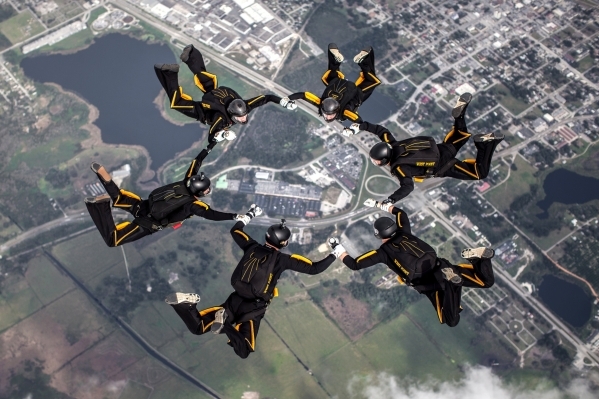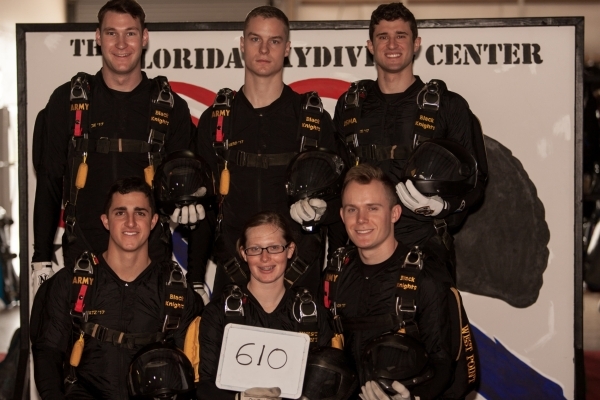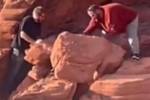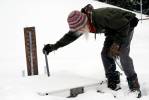West Point cadet from Las Vegas flies high at national skydiving competition — VIDEO
It took more than a bird or a plane to draw attention at Florida Skydiving Center in Lake Wales, Fla., on Jan. 1.
But 21-year-old Las Vegas local and West Point cadet Zachary Beavor did just that, joining five of his West Point peers — all juniors — in plunging through the sky from dizzying altitudes at the United States Parachute Association's 2015 National Collegiate Parachuting Championships. Members of the "Army West Point Break-Up Six" set a national collegiate record for speed, creating formations in the sky within seconds. They also took the gold medal in six-way speed formation.
Dancing with gravity has its benefits, Beavor said.
"Skydiving has allowed me to build up the ability of making sound judgment calls very fast," he said during a Friday phone interview. "We only have about a minute of free fall."
The Break-Up Six is a sub-team of the West Point parachute team, comprised of about 24 cadets known as the Black Knights. On the first round of their three-round competition, the Break-Up Six took just 5.91 seconds from the time they crossed a taped line in their plane to the moment they created their first formation in the sky.
According to Head Coach Tom Falzone, the Break-up Six set a cumulative score record for three rounds that beat out seniors from the Air Force team, and even seniors among their own Black Knights.
"I'm still smiling," said Falzone, who noted that his experience as a coach at the event was akin to watching the "junior varsity team" trouncing the field at a ski race.
But it takes more than junior varsity skills for Beavor and his teammates to literally survive another day as Black Knights. The sport demands meticulous attention to detail, mental acumen, mid-air body manipulation, and, in events such as the six-way speed formation, a cohesiveness with other team members that might be the stuff of gods.
"In six-way speed, anything can go wrong," observed West Point senior Jordan Komm, captain of the Black Knights. "And it can go wrong very quickly."
Merely one round of the six-way speed formation event requires a jump from about 14,000 feet in altitude. At about 5,500 feet, parachuters begin the process of "tracking" — straight-lining the body, "sort of like a pencil," according to Beavor — to glide horizontally across the sky. The cadets create a starburst effect while each heads in a different direction. Several hundred feet away from one another, at about 3,000 feet, they deploy parachutes.
And don't forget about the other two rounds of jumping. All told, Beavor's team created the "Dog Bone," the "Star," and the "Snowflake" formations. All moving so fast that, according to Komm, finding a videographer to keep up is sometimes challenging.
"The learning orientation for skydiving is very rapid," said Beavor. "Because if you don't learn quickly, you will fail. And you will die."
His description of his first skydiving experience as a West Point freshman, nearly two years ago: "Sensory overload."
"I had no idea what was going on around me," he recalled.
Beavor had thought about skydiving when he turned 18, but hadn't acted. At West Point, he heard about the team during basic training, and couldn't resist the prospect of a daily routine that included jumping from helicopters. Out of a few hundred interested cadets, only about eight are chosen each year, he said.
Four hundred jumps later, his experience has changed.
"When we first started out skydiving, it happened so quickly," he said. "Now when I skydive, I feel like it's in slow motion. And I can see every little detail."
The high of the sport for him — and the old experience of getting butterflies at high altitude — has also died off.
"Now I come to train, and I come to be focused," he said.
The quest for focus kept Beavor going even after he'd initially been rejected by West Point. Born at Nellis Air Force Base and raised by a single mom in the Air Force, he graduated from Silverado High School in 2012, he said. He went to UNLV for one year, received good grades, and took another shot at West Point.
He remembers the day he returned from a hike at Red Rock Canyon National Conservation Area and received a call from Rep. Joe Heck — congratulating him on his West Point appointment.
Beavor's current schedule includes 19 to 21 credit hours per semester, compared to a 12-credit-hour schedule at UNLV. He commits about three hours per day solely to parachute team. Saturday and Sunday team practices fill the weekend. Plus, there's daily workout time and military training. When not falling from the sky, Beavor has had to withstand tear gas in West Point's "House of Tears."
For a future Army officer, it's par for the course.
Among the payoffs of parachuting in the midst of that busy schedule: dropping into the action of New York sports stadiums and American Pharoah's Triple Crown win last year, according to Falzone.
As for the reputation of the parachute team within the walls of West Point, "I'd like to say, 'silent professionals,'" Beavor said.





























